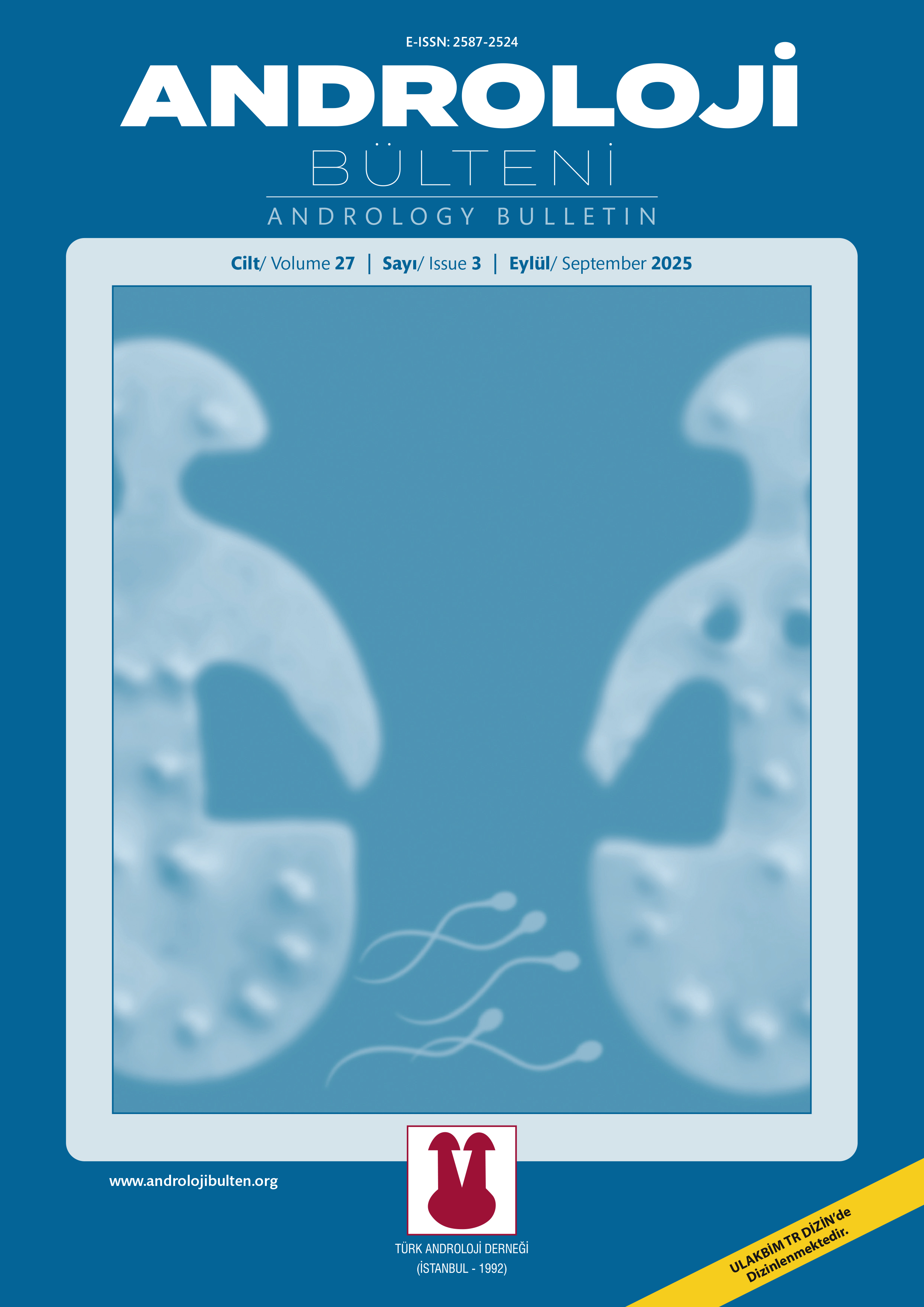
Content of this journal is licensed under a Creative Commons Attribution-NonCommercial 4.0 International License.
Evaluation of systemic immune inflammation index and hematological inflammatory parameters in patients with varicocele: a controlled study
Şaban Oğuz Demirdöğen1, Ahmet Emre Cinislioğlu2, Tugay Aksakallı2, Mehmet Sefa Altay3, Adem Utlu2, İbrahim Karabulut2, İsa Özbey11Ataturk University Medical Faculty, Department of Urology2University of Health Sciences, Erzurum City Hospital, Department of Urology
3Erzurum Private Buhara Hospital, Department of Urology
OBJECTIVE: This study aims to evaluate the relationship between varicocele and inflammation using hematological inflammatory parameters in patients with varicocele and systemic immune inflammation (SII) index, and to contribute to the etiopathogenesis of varicocele.
MATRERIAL and METHODS: The study included 56 healthy volunteers, and 59 patients who were diagnosed to have varicocele in the urology clinics of Erzurum City Hospital between May 2018 and December 2021. Patient files were retrospectively investigated and the data of whole blood analysis were recorded. Parameters obtained from whole blood analysis and systemic immune inflammation index were compared between groups.
RESULTS: A total of 59 adult male who have diagnosed as varicocele were included in the patient group and 56 healthy adult volunteers were included in the control group. When the two groups were compared in terms of body mass index and mean age, there was no statistically significant difference. (p=0,915 and p=0.25, respectively). Lymphocyte count was significantly reduced in the patient group (p<0.001). Neutrophil/Lymphocyte ratio (NLR), Monocyte/Lymphocyte ratio (MLR), Platelet/Lymphocyte ratio (PLR) and SII index were found to be significantly higher in the patient group when compared for both groups (p<0.001, p=0.033, p<0.001 and p=0.005, respectively). There was no relation between the grade of varicocele and hematological inflammatory parameters or systemic inflammation index in the patient group. When we examined the relationship between semen parameters and SII index in patients with varicocele, we found that lymphocyte count, neutrophil count, NLR and SII index were significantly higher in patients with abnormal semen parameters compared to patients with normospermic varicocele (respectively; p=0.004, p=0.003, p< 0.001 and p<0.001) SII has the best predictive power in predicting Impaired Semen Quality in varicocele patients among inflammatory parameters.
CONCLUSION: SII index and hematological inflammatory parameters can show that inflammation is one of the factors playing a role in varicocele pathogenesis. Our study has important results showing the relationship between hematological inflammatory parameters and especially SII index and semen parameters in patients with varicocele. Prospective, randomized studies with larger numbers of patients and control groups should be conducted in order to investigate whether SII index and hematological inflammatory parameters can be used in the diagnosis, follow-up and treatment of varicocele.
Varikoselli hastalarda sistemik immün enflamasyon endeksi ve hematolojik enflamatuvar parametrelerinin değerlendirilmesi: Kontrollü bir çalışma
Şaban Oğuz Demirdöğen1, Ahmet Emre Cinislioğlu2, Tugay Aksakallı2, Mehmet Sefa Altay3, Adem Utlu2, İbrahim Karabulut2, İsa Özbey11Atatürk Üniversitesi Tıp Fakültesi, Üroloji Anabilim Dalı, Erzurum, Türkiye2Sağlık Bilimleri Üniversitesi, Erzurum Şehir Hastanesi Üroloji Anabilim Dalı, Erzurum, Türkiye
3Erzurum Özel Buhara Hastanesi, Üroloji Kliniği, Erzurum, Türkiye
AMAÇ: Bu çalışma, varikosel ve inflamasyon arasındaki ilişkiyi, varikoselli hastalarda hematolojik inflamatuar parametreleri ve sistemik immün inflamasyon (Sİİ) indeksini kullanarak değerlendirmeyi ve varikosel etiyopatogenezine katkıda bulunmayı amaçlamaktadır.
GEREÇ ve YÖNTEMLER: Çalışma, Mayıs 2018 ve Aralık 2021 tarihleri arasında Erzurum Şehir Hastanesi Üroloji polikliniklerinde varikosel tanısı konan 59 hasta ve 56 sağlıklı gönüllüyü içermektedir. Hasta dosyaları geriye dönük olarak incelenmiş ve tam kan analizi verileri kaydedildi. Tam kan analizinden elde edilen parametreler ve sistemik immün inflamasyon indeksi gruplar arasında karşılaştırıldı.
BULGULAR: İki grup arasında vücut kitle indeksi ve ortalama yaş açısından karşılaştırıldığında istatistiksel olarak anlamlı bir fark yoktu (sırasıyla p=0,915 ve p=0,25). Lenfosit sayısı hasta grubunda istatisteksel olarak anlamlı şekilde düşüktü (p<0,001). Nötrofil/Lenfosit oranı (NLO), Monosit/Lenfosit oranı (MLO), Platelet/Lenfosit oranı (PLO) ve Sİİ indeksi, her iki grup için karşılaştırıldığında hasta grubunda anlamlı derecede yüksekti (sırasıyla p<0,001, p=0,033, p<0,001 ve p=0,005). Varikoselli hastalarda semen parametreleri ile Sİİ indeksi arasındaki ilişkiyi incelediğimizde, lenfosit sayısı, nötrofil sayısı, NLO ve Sİİ indeksinin, normospermik varikoselli hastalara kıyasla anormal semen parametresine sahip hastalarda anlamlı şekilde yüksek tespit edildi (sırasıyla; p=0,004, p=0,003, p<0,001 ve p<0,001). Sİİ, inflamatuar parametreler arasında varikoselli hastalarda bozulmuş semen kalitesini öngörmede en iyi prediktif güce sahipti.
SONUÇ: Sİİ indeksi ve hematolojik inflamatuar parametrelerle ilgili sonuçlarımız, inflamasyonun varikosel patogenezinde rol oynayan faktörlerden biri olduğuna işaret edebilir. Çalışmamız, varikoselli hastalarda hematolojik inflamatuar parametreler ve özellikle Sİİ indeksi ile semen parametreleri arasındaki ilişkiyi gösteren önemli sonuçlara sahiptir. Varikosel tanısı, takibi ve tedavisinde Sİİ indeksi ve hematolojik inflamatuar parametrelerin kullanılıp kullanılamayacağını araştırmak için daha fazla sayıda hastayı içeren prospektif, randomize kontrollü çalışmalar yapılmalıdır.
Manuscript Language: Turkish
(288 downloaded)













